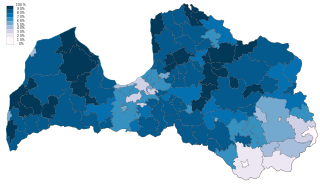
Latvian, also known as Lettish, is an East Baltic language belonging to the Indo-European language family and it is spoken in the Baltic region. It is the language of Latvians and the official language of Latvia as well as one of the official languages of the European Union. There are about 1.5 million native Latvian speakers in Latvia and 100,000 abroad. Altogether, 2 million, or 80% of the population of Latvia, spoke Latvian in the 2000s, before the total number of inhabitants of Latvia slipped to 1.8 million in 2022. Of those, around 1.16 million or 62% of Latvia's population used it as their primary language at home, though excluding the Latgale and Riga regions it is spoken as a native language in villages and towns by over 90% of the population.
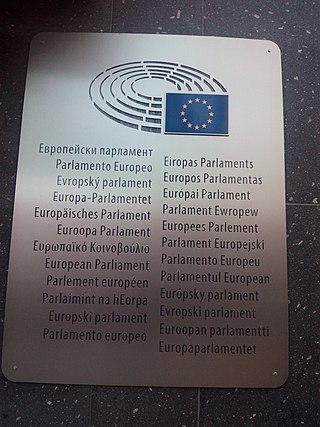
The European Union (EU) has 24 official languages, of which three – English, French and German – were considered "procedural" languages but this notion was abandoned by the European Commission. Today, English and French are used in the day-to-day workings of the institutions of the EU. Institutions have the right to define the linguistic regime of their working, but the Commission and a number of other institutions have not done so, as indicated by several judicial rulings.

University of Latvia is a public research university located in Riga, Latvia. The university was established in 1919.

The Coat of arms of the Republic of Latvia was officially adopted by the Constitutional Assembly of Latvia on 15 June 1921, and entered official use starting on 19 August 1921. It was created using new national symbols, as well as elements of the coats of arms of Polish and Swedish Livonia and of the Duchy of Courland and Semigallia. Thus, the coat of arms combines symbols of Latvian national statehood, as well as symbols of its historical regions. The Latvian national coat of arms was designed by Latvian artists Vilhelms Krūmiņš and Rihards Zariņš.

Latgalian is an East Baltic language; it is sometimes considered a dialect of Latvian. The language law of Latvia classifies it as a "historical form of Latvian". It is mostly spoken in Latgale, the eastern part of Latvia. The 2011 Latvian census established that 164,500 of Latvia's inhabitants, or 8.8% of the population, spoke Latgalian daily. 97,600 of them lived in Latgale, 29,400 in Riga and 14,400 in the Riga Planning Region.
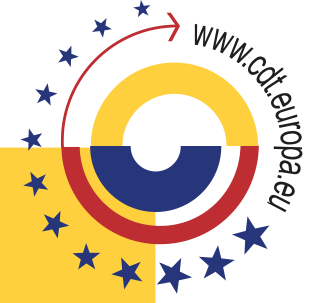
The Translation Centre for the Bodies of the European Union (CdT) is an EU agency based in Luxembourg City. Its primary role is to cater for the diverse multilingual communication needs of the EU agencies and other EU bodies. In addition, it may be called upon by the EU institutions to absorb any surplus work they may have.

The Secretariat of the Interior is the executive department of the Mexican government concerned with the country's domestic affairs, the presenting of the president's bills to Congress, their publication in the Official Journal of the Federation, and certain issues of national security. The country's principal intelligence agency, CNI, is directly answerable to the Secretary of the Interior. The Secretary is a member of the president's Cabinet and is, given the constitutional implications of the post, the most important cabinet member. Additionally, in case of both temporary and absolute absences of the president, the Secretary of the Interior assumes the president's executive powers provisionally. The Office is practically equivalent to Ministries of the Interior in most other countries and is occasionally translated to English as Ministry, Secretariat or Department of the Interior.
The State Council of Lithuania was a legislative institution in interwar Lithuania. It was an advisory institution that codified existing and proposed new laws. It was established by the constitution adopted on 15 May 1928. President Antanas Smetona dismissed the Third Seimas in March 1927. Although the constitution of 1928 retained the Seimas as the legislative body, new elections were not called until June 1936. In the absence of a parliament, the State Council performed some legislative functions of the Lithuanian government. It was liquidated on 26 July 1940 by the People's Government of Lithuania. Its chairman in 1928–1938 was Stasys Šilingas who became the prime legal architect of the authoritarian regime of Smetona. The archives of the council were lost after the Soviet occupation. Therefore, its activities are known mainly from the press, memoirs of its members, and documents of other institutions.

'Banq' and 'banc' are alternative spellings used in company names to evade legal restrictions on the use of the word 'bank' while maintaining a similar pronunciation. This practice is common in the financial services industry, particularly in the United States.
The Ministry of Law and Justice in the Government of India is a cabinet ministry which deals with the management of the legal affairs, legislative activities and administration of justice in India through its three departments namely the Legislative Department and the Department of Legal Affairs and the Department of Justice respectively. The Department of Legal Affairs is concerned with advising the various Ministries of the Central Government while the Legislative Department is concerned with drafting of principal legislation for the Central Government. The ministry is headed by Cabinet Minister of Law and Justice Arjun Ram Meghwal appointed by the President of India on the recommendation of the Prime Minister of India. The first Law and Justice minister of independent India was Dr. B. R. Ambedkar, who served in the Prime Minister Jawaharlal Nehru's cabinet during 1947–51.

The president of Latvia is head of state and commander-in-chief of the National Armed Forces of the Republic of Latvia.

Articles 4 and 114 of the Constitution of Latvia form the foundation for language policy in Latvia, declaring Latvian to be the official state language and affirming the rights of ethnic minorities to preserve and develop their languages. Livonian language is recognized as "the language of the indigenous (autochthon) population" in the Official Language Law, but Latgalian written language is protected as "a historic variant of Latvian." All other languages are considered foreign by the Law on State Language. Latvia provides national minority education programmes in Russian, Polish, Hebrew, Ukrainian, Estonian, Lithuanian, and Belarusian.

The State Border Guard is the border guard of Latvia.
The State Chancellery of Latvia is a central public administration institution directly subordinated to the Prime Minister.

The Ministry of Justice of the Republic of Uzbekistan is the central government body responsible for ensuring the consistent implementation of a unified state policy in the areas of lawmaking and law enforcement in Uzbekistan.
The State Audit Office of the Republic of Latvia is a public auditing body overseeing the finances of national and local government in Latvia. It was first created in 1918, and re-established in 1992 when Latvia again became independent.
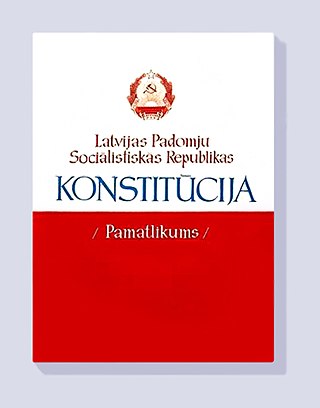
The 1978 Constitution of the Latvian SSR, officially the Constitution of the Latvian Soviet Socialist Republic was the constitution of the Latvian Soviet Socialist Republic adopted on April 18, 1978 at the eighth session of the 9th Convocation of the Supreme Soviet of the Latvian SSR.
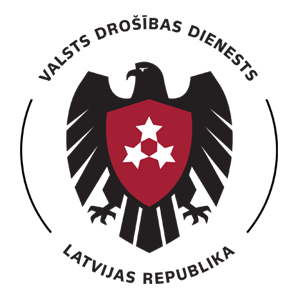
The State Security Service or VDD is one of three Latvian security and intelligence services. VDD is the civilian counterintelligence and internal security service, which gathers intelligence from a number of sources and conducts its analysis, informs senior state officials about the identified risks to national security as well as acting to neutralize those risks.

Latvianization is a cultural assimilation of something non-Latvian into Latvian. This process was an important component during the several waves of Latvian national awakening.

The Constitution Protection Bureau is a Latvian state security institution. It conducts intelligence and counterintelligence activities, ensures the protection of state secrets, as well as classified information of the European Union and NATO. The Bureau operates under the supervision of the Cabinet of Ministers of Latvia.















